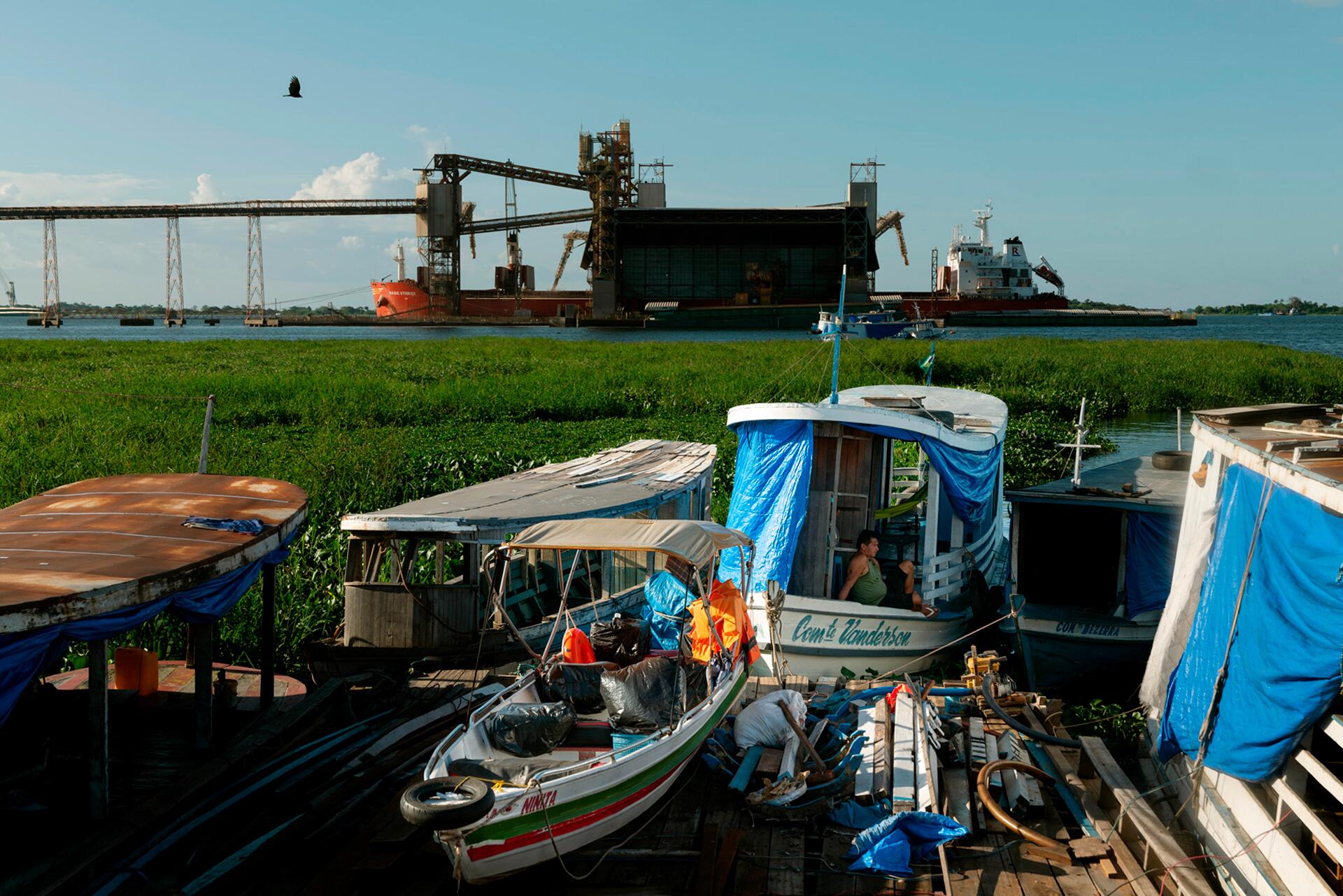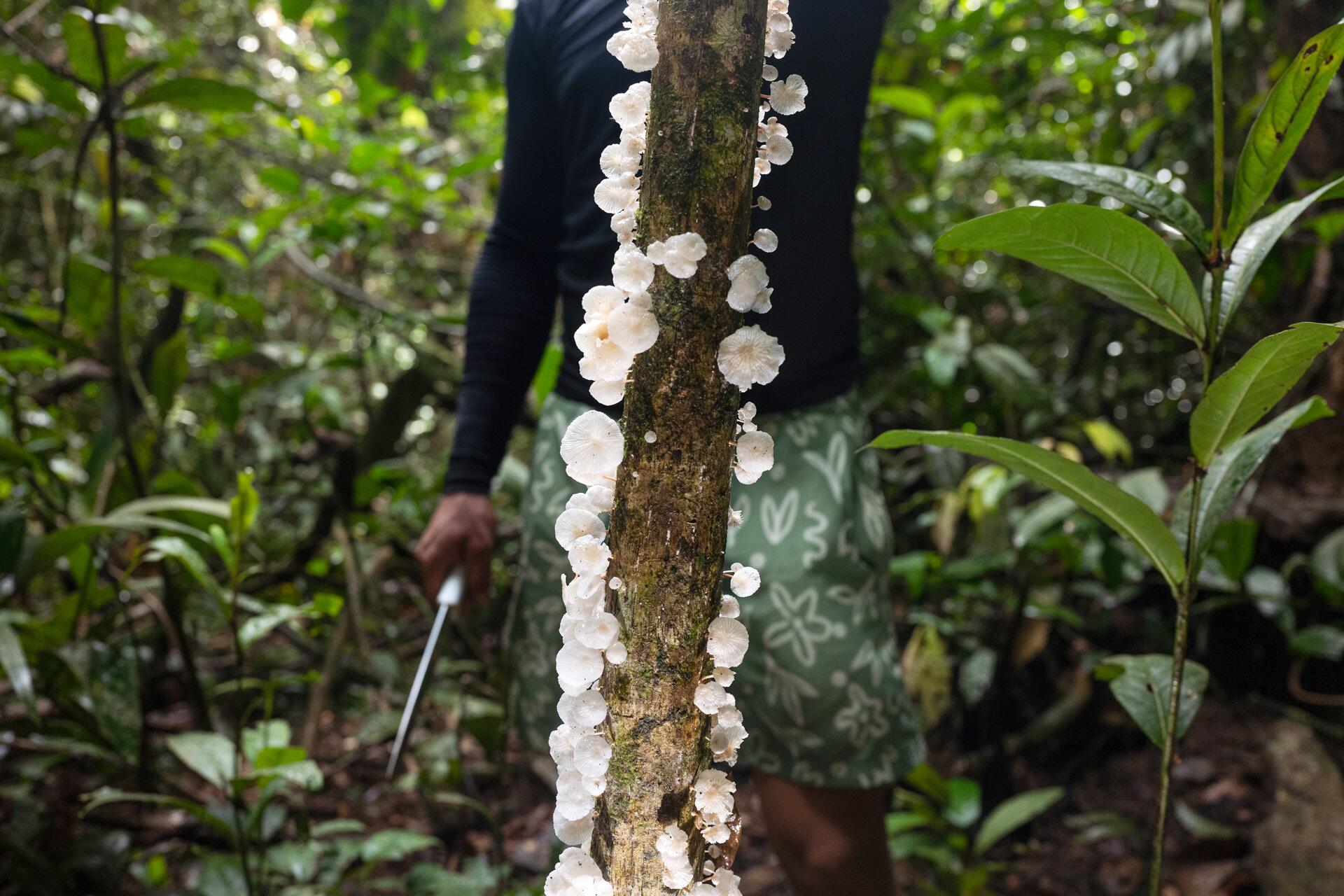River dolphin bodies in a row, bodies cooked by the heat of the water, bodies unable to do resist our desire to destroy. The extreme drought in the Amazon is caused by the combination of a natural El Niño and global heating produced by human activities. This may be behind the unprecedented death of at least 139 endangered river dolphins, the causes of which are being investigated. Climate change did not suddenly appear, it is something that for decades Indigenous people and scientists have predicted – predicted, forewarned, shouted about, all of which fell on deaf ears. But no, this isn’t about an apocalypse or a tragedy, much less a fatality, as if human beings were merely exposed to much greater natural forces, like in the distant past. The images we see on the screens of our technological devices are mirrors – the reflection of the violence produced against nature, of excessive extraction from the forest and other biomes. It is the work a minority of humans were able to do in a little over two centuries, when the “industrial revolution” (as we learn from books and history classes to call it) began ripping increasing proportions of fossil fuels – coal, gas, and oil – from the earth. And when what should have stayed underground was drawn from the depths, it started to emit carbon dioxide, the primary greenhouse gas. And so we, humans, began to heat the planet, to change the climate and the shape of the Earth, the only home we have and which we share with all of the millions of other species. And then came October 2023 and we were confronted with the bodies of river dolphins.
The river dolphins may only be the most visible part of the nightmare. Millions of other non-human beings, from birds to bees, from fish to frogs, from panthers to primates, are suffering right now – and many have already died or will die. Thousands of Indigenous persons and traditional forest peoples like the ribeirinhos and quilombolas are severely suffering, some of them exiled by dry rivers. In nature, living and dying is done in connection, because everything is interdependent. If we do not want these scenes to be repeated, in a more and more horrifying way, more and more painfully, with more and more deaths, we will need to look to those responsible for global heating. And fight to stop them. Not tomorrow – today.
This is what SUMAÚMA’s journalism does. This newsletter contains our first report from the UNSUSTAINABLE series – how transnational corporations rely on impunity to violate the Amazon. This series is a partnership between the Transnational Law Institute at King’s College London and SUMAÚMA – Journalism from the Center of the World. In this first report, coordinated by investigations editor Ana Magalhães, with reporting by Isabel Harari and photographs by Alessandro Falco, we show how Cargill, called “the worst company in the world” by the Mighty Earth organization, is working to build a third large port in the forest. Over the next few weeks and months, we will be publishing in-depth investigative reporting on other transnational corporations that, despite the catastrophe they produce, continue to violate the forest and its peoples.

A Cargill terminal in Santarém, in the state of Pará: there has been no study on the impacts on Indigenous and quilombola populations. Photo: Alessandro Falco/SUMAÚMA
It’s much easier to shine a light on illegal miners and timber cutters than on those at the ends of the chain, far from the Amazon, in the major cities of Brazil’s Southeast, South, and Central-West regions, who never have to get down and dirty in the mud to see fatter profits and lower risk. Shining a light on transnational corporations, some of which fly the flags of countries that normally give lovely speeches on environmental conservation, is essential. Just as essential as understanding how these private giants move forward, oftentimes with the help of government agents, in spite of the law or by taking advantage of the gaps found in it.
Despite scientific warnings, despite global activism, despite the growing number of climate refugees, despite piles of river dolphin bodies, transnational corporations continue to swallow up worlds in the Amazon. UNSUSTAINABLE will put these companies under a magnifying glass, the ones devouring a future that belongs to the next generations of humans and non-humans.
Read the first report in the series, on U.S.-based company Cargill. Our latest edition also includes a piece by journalist and biologist Jaqueline Sordi on the connections between the Amazon’s scorching hot waters and the cyclones devastating southern Brazil. Jaqueline’s byline can be found elsewhere in this issue, on an interview with scientist Miriam Marmontel, the leader of a group researching aquatic mammals in the Amazon for the Mamirauá Institute for Sustainable Development. Miriam talks about the horrific scenes she witnessed on Lake Tefé, in the Amazon, and details the work being done to find the cause of the river dolphins’ deaths and to protect the species.
On October 3, Petrobras turned seventy years old. Natalie Unterstell, president of Instituto Talanoa, an institute dedicated to climate change policy, has written a very informative article on the impasse around oil. Until very recently, the world and Brazil have fed off of the idea that oil is synonymous with wealth, despite warnings from climate and earth science experts. Now, in president Luiz Inácio Lula da Silva’s third term, regardless of all the extreme events the country has been through this year, Petrobras, with the support of most of the government and the president himself, wants to open a new front in oil exploration in the Foz do Amazonas basin, located at the mouth of the Amazon River along Brazil’s so-called “equatorial margin.”
SUMAÚMA fights to respect all life, whether human or non-human. Because humans have placed themselves at the center, at the top of the hierarchy, the more different we are from our neighbors, the greater our lack of knowledge and indifference to their fate. As if one person’s fate did not depend on everyone’s fate. In this issue, I invite you to read my report on the fungi of the Amazon, co-authored with academic scientist Noemia Kazue Ishikawa and forest scientist Francisco Marques Bezerra. This is a story that requires dedication – not because it is hard or complicated, but because it harks to another world that wraps around us, but which we do not notice, opening another layer of perception of the Earth – and of our own lives.
We also want to share that SUMAÚMA received a fourth award in its first year: the report “Forest defenders demand more protection,” by Catarina Barbosa and Talita Bedinelli, received an honorable mention in the Vladimir Herzog Journalism Award for Amnesty and Human Rights. Our reporters documented the indignity experienced by those who, with their lives threatened when they place their bodies on the front line in the war against nature, are forced to leave their territories in the Brazilian state of Pará, facing all kinds of hardships and humiliations within the programs that are supposed to protect them.
These are different reports which we’ve gathered for this issue, but they are connected. We need to once again interpret the world by making connections – or we will fail to understand what and who is destroying our lives. Without this understanding, we cannot defend ourselves from the attacks. If we cannot defend ourselves, it is no longer just the near future that will be threatened, but the present, as shown by the bodies of the victims of the cyclones in the South and of the extreme drought in the Amazon. The time is now. The national and transnational companies destroying our home must be stopped – before the fate of the river dolphins becomes our own.
Fact check: Plínio Lopes
Proofreader (Portuguese): Valquiria Della Pozza
Spanish translation: Meritxell Almarza
English translation: Sarah J. Johnson
Visual editing: Lela Beltrão
Editorial workflow, copy editing, and layout: Viviane Zandonadi

Fungi found on a fallen tree trunk in the forest, in the municipality of Altamira, Pará, in the Brazilian Amazon. Photo: Alessandro Falco/SUMAÚMA





